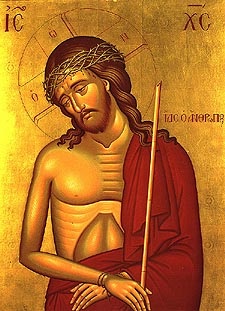Archpastoral Message of His Beatitude, Metropolitan Herman at the beginning of Great Lent 2008
 |

Archpastoral Message of His Beatitude, Metropolitan Herman at the beginning of Great Lent 2008
To the Very Reverend and Reverend Clergy, Monastics and Faithf of the Orthodox Church in America
Dearly Beloved in the Lord:
Standing out among the liturgical services of the Lenten Triodion is the Divine Liturgy of Presanctified Gifts. In the introduction to the service booklet published by the OCA’s Department of Religious Education, Protopresbyter Thomas Hopko calls the Divine Liturgy of Presanctified Gifts “one of the great masterpieces of Orthodox piety and liturgical creativity.” As this Liturgy draws to a close, we hear the Prayer Before the Ambo. In this prayer Great Lent is called the “all-revered days for purification of souls and bodies, for restraint of passions, and for hope in the resurrection.”
It can be easy to look at fasting as a chore. Sometimes the coming of Lent is even filled with a measure of dread. There are more services and it seems like such a long time to live without foods and diversions that are so pleasing to us. The above prayer, however, reminds us that Great Lent is a holy time, “all-revered”. In the Gospel, our Lord teaches us that “the Sabbath was made for man, not man for the Sabbath.”(Mark 2:27) The times and seasons of the liturgical year are gifts given to us by God for our healing, edification and ongoing growth in His Divine image. Great Lent is a time to cherish as a precious gift, knowing that the fruits it offers are well worth the extra effort.
Great Lent offers us the gift of the “purification of souls and bodies”. Just as an engine cannot work properly unless it is clean, we cannot function properly if we are impaired by physical and spiritual pollutants. Fasting is good for the body and the soul. It cleanses us physically and allows us a spiritual clarity that can only come through ascetic struggle. Our Lord Jesus Christ reminds us that some unclean spirits can only be expelled “by prayer and fasting.”(Matthew 17:21) Being more alert, more focused, we pray with less distraction, making ourselves more open to the indwelling of the Holy Spirit within us.
Through our fast God is able to work within us and we are given the gift of the “restraint of passions.” The original meaning of “passion” is suffering. Suffering is not limited to physical pain but can also be the result of deep inner conflict. Every Christian faces the inner tension between following the Way of Christ and following the precepts of our fallen nature; this choice is at the heart of “repentance”, the “change of mind” away from sin and towards God to which we are called again and again during Great Lent. Although it seems like an easy choice, it is in fact a very difficult one to make and even harder to maintain. Thus, St. Paul says to the Romans: “For what I will to do, that I do not practice; but what I hate, that I do.”(Romans 7:15) Through the self-discipline of the fast, we are more open to the active presence of God within us. The active presence of God within us gives us the strength, wisdom and courage needed to veer away from our sinful inclinations and to fix our gaze on the heavenly Kingdom. As St. Paul says to the Galatians, “it is no longer I who live, but Christ lives in me”; this is the first fruit of our fasting.
The holy season of Great Lent is indeed a time of increased effort. It is a time to take a sober and honest look at ourselves, at our life and relationship with God. This is not easy work and it is crucial that we keep the context of our efforts in mind. We do not apply ourselves to this task in a gloomy fashion but with joyful “hope in the resurrection.” It is the anticipation of Pascha, the triumph of the Risen Christ, that we hold in our hearts as we fast. We struggle with self-denial, seeking cleansing of soul and body and inner healing of passions to more perfectly participate in the radiance of Christ’s resurrection.
In his letter to the Church of Corinth, St. Paul says, “He who sows sparingly will also reap sparingly, and he who sows bountifully will also reap bountifully. So let each one give as he purposes in his heart, not grudgingly or of necessity; for God loves a cheerful giver.”(2 Corinthians 9:6,7) Though the Apostle speaks specifically of monetary gifts, this principle applies to any and all giving that we do for Christ, including the “giving-up” that we do during the fasts. Borrowing these words of St. Paul, we can say that we are called to fast “each one as he purposes in his heart, not grudgingly or sparingly or of necessity,” but cheerfully, knowing that our goal is the celebration of the life-giving feast of feasts—Pascha, the Resurrection of our Lord and Savior Jesus Christ.
It is our tradition at the beginning of Great Lent to ask forgiveness of those whom we have angered, affronted or sinned against in some other way. We still find ourselves at a point in our history when many feel pain and anger as a result of misdeeds that have occurred in our Church. If I have sinned against you in any way, and especially if my actions in addressing these misdeeds have caused you pain, I ask for your forgiveness and prayers.
Wishing you a spiritually edifying Lenten season and Passion Week, and a joyous celebration of Holy Pascha, I bestow my archpastoral blessings and with paternal love, I remain
With love in Christ,
![]()
+ HERMAN
Archbishop of Washington and New York
Metropolitan of All America and Canada
